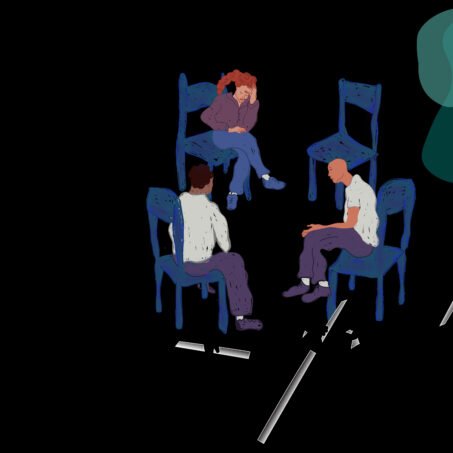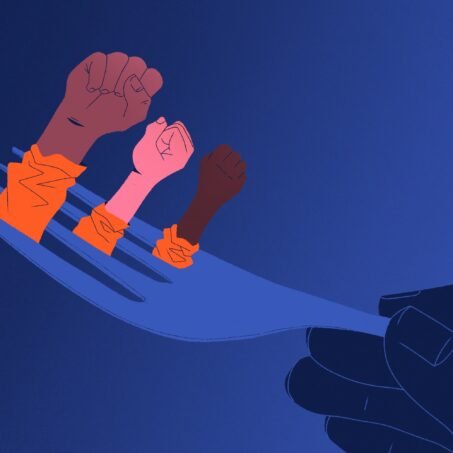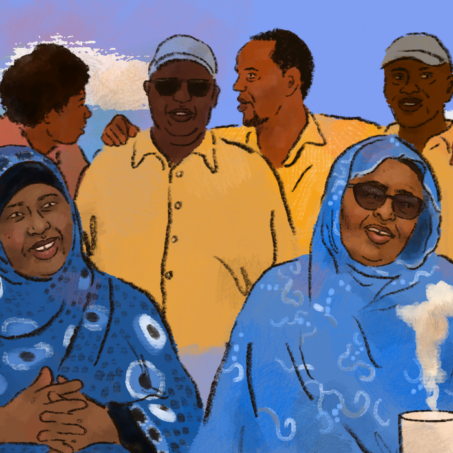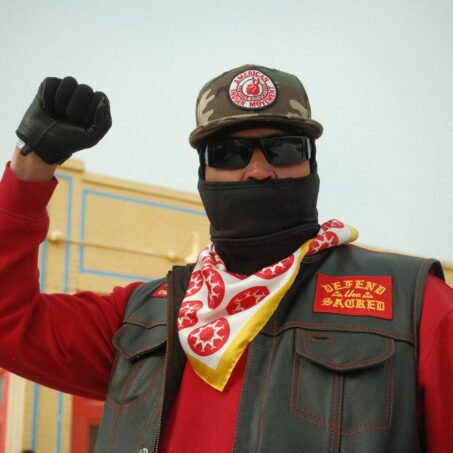Scrolling through my TikTok ForYou page last month, I never expected to come across the official account of the Israeli Defense Force (IDF). Yet, there I was, watching women Israeli combatants parody the behaviours of macho soldiers in a TikTok video, captioned ‘Just a bunch of empowered women defending their country’ with the hashtag #HotGuyShit. These videos have continued during the recent escalating violence in Palestine, showing that for the IDF, it’s all business as usual. It seems paradoxical and sinister that a violent military organisation would be sharing content on TikTok’s youth dominated platform. However, the weaponisation of social media by global militaries is actually becoming worryingly commonplace – a phenomenon termed ‘militainment’ by academic and author Roger Stahl.
Social media has emerged as a critical arm of Israel’s public diplomacy apparatus. Extensive Israeli territorial gains made during the 1967 war (which displaced up to 325,000 Palestinians) upended the state’s ‘underdog identity’ and resulted in a partial loss of global public sympathy. Unmediated by the gatekeepers of conventional media, platforms such as TikTok now serve as a tool to re-affect a more sympathetic foreign audience for the settler colonial state. For example, in an attempt to frame Palestine as terrorists and therefore justify the actions of Israel, the IDF tweeted a Valentine’s Day post this year captioned ‘Hezbollah decided we’re the perfect ones… to terrorize”. The accompanying image, a meme-ified Valentine’s note, depicted Hezbollah’s Secretary General, Hassan Nasrallah, asking “are you a tunnel? cause I’m digging you”.
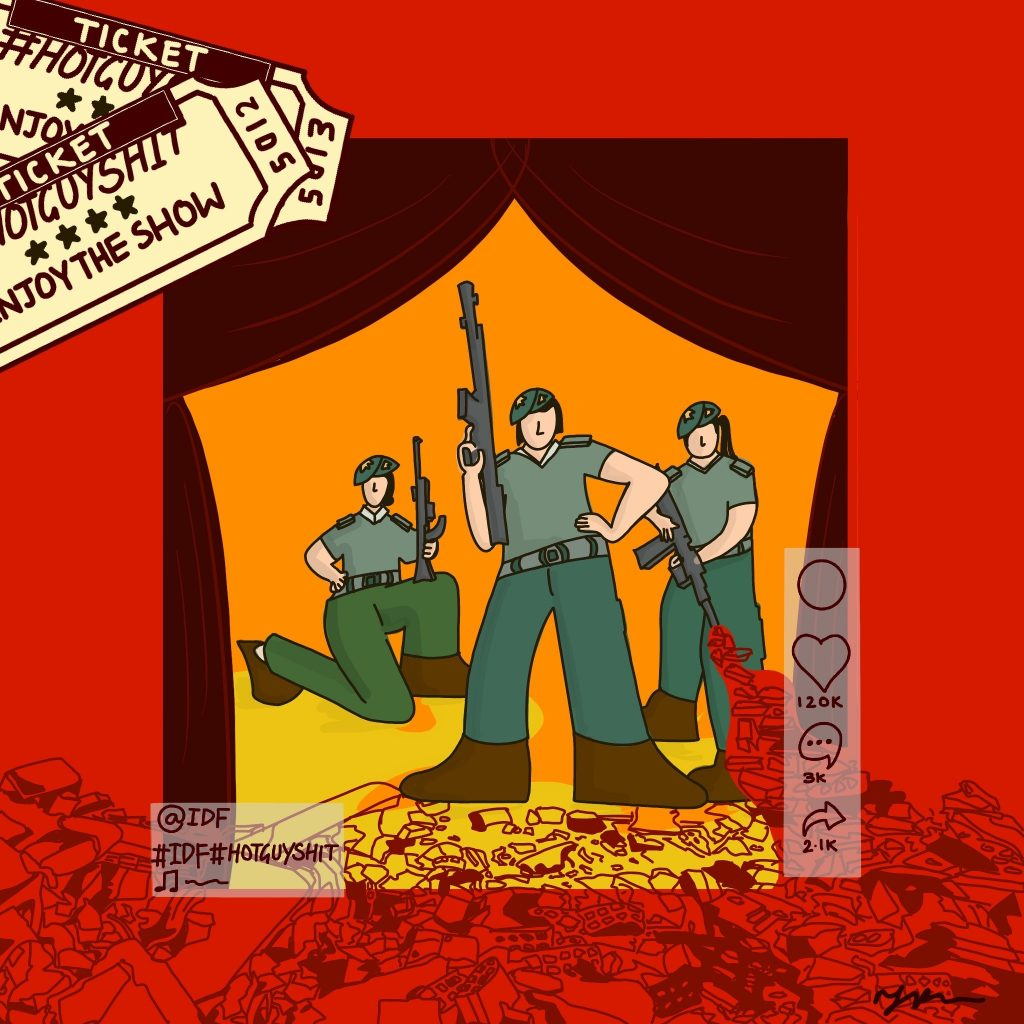
By constructing this online ‘funny guy’ persona, the IDF presents itself as an informal, comedic entity intended to distract from the institution’s blatantly aggressive military policies. It is deeply troubling, as Angela Davis says, that “the Israeli military [make] no attempt to conceal or even mitigate the violence they inflict on the Palestinian people”. And this rings true for their TikTok content, too: they don’t shy away from the violence, they merely dress it up with background music and condense it into 60 second videos. Broadcast to a following of over 32,000 TikTok users, the content on @idf (the IDF’s English TikTok account) hence not only normalises this Israeli military violence but makes light of it. TikTok militainment therefore goes beyond the commonsense depiction of military conflict: by presenting violence as comedic entertainment it becomes a virtual commodity to be liked and shared.
TikTok militainment draws parallels with the Israeli state’s strategy of ‘pinkwashing’ which, as described by novelist and LGBTQI+ activist Sarah Schulman, is a practice which seeks to conceal the state’s violations of Palestinian human rights behind a guise of progressiveness, centred around images of Israel’s vibrant gay scene. Whilst pinkwashing turns Israel’s queer community into liberal propagandists, TikTok militainment similarly weaponises Israeli female combatants for the same cause. The Israeli military is made to look fun and relateable – which in turn sanitises its violent apartheid tactics – because they occur within the ‘modern’, TikTok-able institution of the IDF.
Moreover, in viewing just a handful of @idf’s videos, you realise they are trying to create an image of the IDF as a site of gender equality and female empowerment. #HotGuyShit’s footage runs to the voiceover, ‘I can’t talk right now, I’m doing hot guy shit’, parodying the popularised TikTok sound ‘I can’t talk right now, I’m doing hot girl shit’, a line from Megan Thee Stallion’s ‘Girls in the Hood’. However, this misguided attempt at platforming empowered women who can ‘do everything a man can do’ actually works against this aim. By playing on the #HotGuy/#HotGirl parallel, this TikTok suggests that achievement of “soldierness” for female combatants necessitates not only an adoption of an aggressive ethnic cleaning mindset, but a denial of their femininity.
This is what Judith Butler describes as the ‘stylisation of the body’. In #HotGuyShit, I watch a female combatant pose, flexing her bicep muscle in a show of masculine strength. Although intended as light-hearted, this action alludes to how military training is an intently bodily process. In learning to march, stand-to-attention, and handle heavy weaponry, combatants are continually learning how to style their bodies so that they mimic the idealised masculine behaviours of the male-soldier-prototype.
Within the Israeli cultural context, gender performances take on new and intensified meanings. The creation of Israel in 1948 (otherwise known as the ‘Nakba’, the catastrophe in Arabic), which enacted an ethnic cleansing, dispossession and displacement of the Palestinian population, embedded what Avi Shlaim calls a ‘military mentalite’ into Israeli cultural conscience which conceptualises the “good” Israeli citizen as the male, Jewish, Ashkenazi soldier. Mandatory military conscription reifies this soldier-citizen ideal for successive Israeli generations. Military service socialises Israeli youth into full citizenship via the masculinised “initiation rite” of IDF conscription. Thus, the demands placed on the Israeli soldier to perform as the “macho” warrior can persist even after military service for the ordinary Israeli citizen.
The prevalence of weapons in TikTok’s #HotGuyShit also forms a crucial part of combatants’ gendered performances. Just as Anoop Nayak and Mary Kehily propose lipstick as a ‘paraphernalia of gender’ for ‘girling’ processes, weapons similarly constitute gender paraphernalia for the production of the violent, masculine warrior. In #HotGuyShit, female combatants are seen driving tanks and operating military machinery. Their proximity to destructive weaponry confirms their capacity and willingness to commit violence – the defining attribute of the military-masculine prototype.
Whilst clear that these weapons are destructive and representative of an apartheid state, they are not framed as such. Instead, they are presented as technical and sanitised. This is tactical and typical of some of the IDF’s other social media posts. For example, in the 2014 Gazan War, the Ministry of Foreign Affairs posted aerial footage on Twitter which dehumanised Palestinians to blurry, grey dots. The IDF’s TikTok followers hence do not have to grapple with the moral dilemmas underlying Israeli defense policy. Instead they are encouraged to sit back, relax, and enjoy the show.
Indeed, whilst watching the smiling female combatants in #HotGuyShit, I can’t stop thinking about the seductive capacity of the virtual messages of militainment’s architects. At 21, I am a similar age to #HotGuyShit’s female protagonists and so it is easy to think that these “empowered” combatants are like me. Yet, I realise that any feelings of commonality toward Israeli combatants are of strategic use to the IDF. Aware of the age parallel between TikTok’s young user demographic and its own recruits undertaking mandatory service, the IDF exploits TikTok as the ideal site for aligning foreign civilians with Israeli military violence, exemplifying social media’s ability to humanise and hence legitimise military action.
The IDF’s attempt at co-opting feminism is further weakened by its inconsistency. When delving just slightly deeper into the page’s history, past videos become characterised by a misogynistic sense of humour. In the IDF’s version of the TikTok trend #SuperModel, I watch a camera pan over an Israeli tank with the caption, “We’re serving looks since 1948” whilst listening to a deep voice recite: “And I’m telling you Bob, with a body like that, a face like that, and legs like hers, she’s gonna be a Victoria Secret supermodel”. Not only is this a grotesque attempt at co-opting internet language and trends to humanise destruction, these panning camera shots replicate the objectifying male gaze as a soldier ogles at the attractive, ‘female’ tank, thereby reducing females to mere objects ready for male use. Just as Israel’s pinkwashing is proven to be shallow, given that same-sex couples cannot marry under Israeli law, the IDF’s feminist persona can also be easily contradicted. But still it persists.
Right now, Israel’s ethnic cleansing in Palestine is the site of international news coverage since the IDF carried out home invasions of Palestinians in Sheikh Jarrah. While Israeli military occupation and land theft are an ongoing colonial phenomenon in the region, this particular occasion caught the world’s attention due to the IDF’s subsequent attack on the Al-Asqua mosque, an extremely holy and busy site, which was full of Palestinian Muslims peacefully observing the end of Ramadan. Despite today’s announcement of a ceasefire, the state-sanctioned violence from the Israeli army has led to soaring Palestinian civilian casualties, making the IDF’s ‘feminist’ and ‘funny guy’ personas on TikTok as all the more sinister. This militainment, the masquerading of violence and atrocities as fodder for a casual stroll through social media, is the latest example of the IDF’s military mindgames.
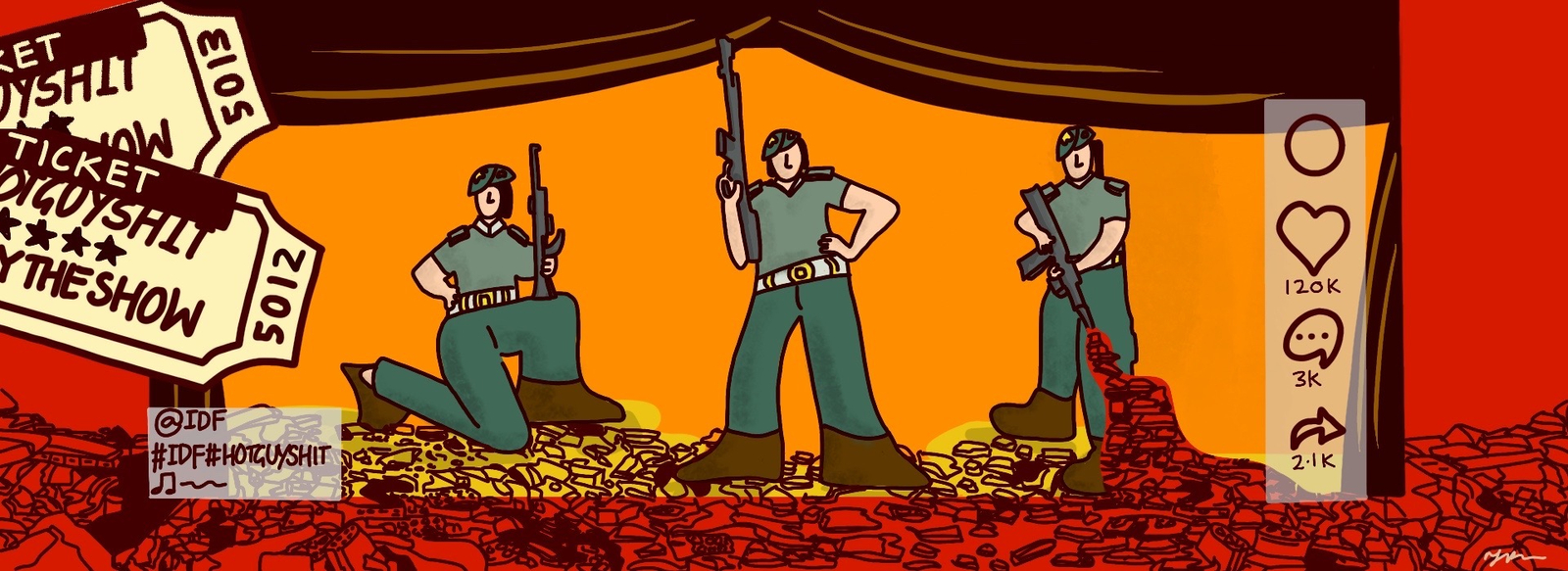
See more of Natasha’s work on instagram




